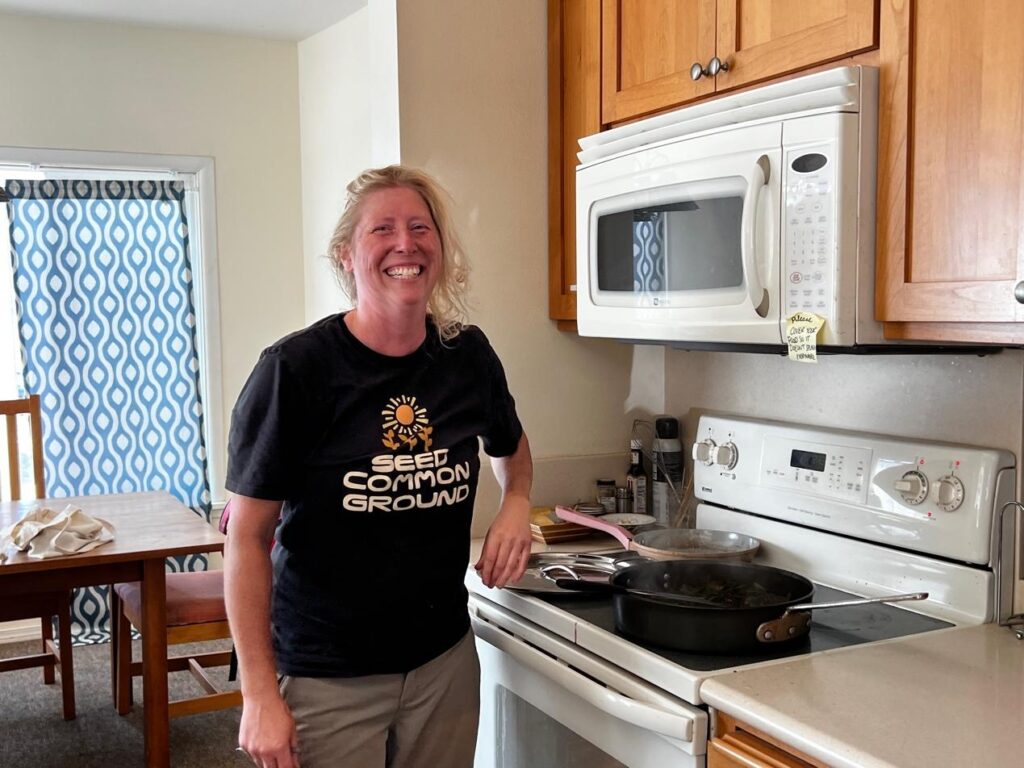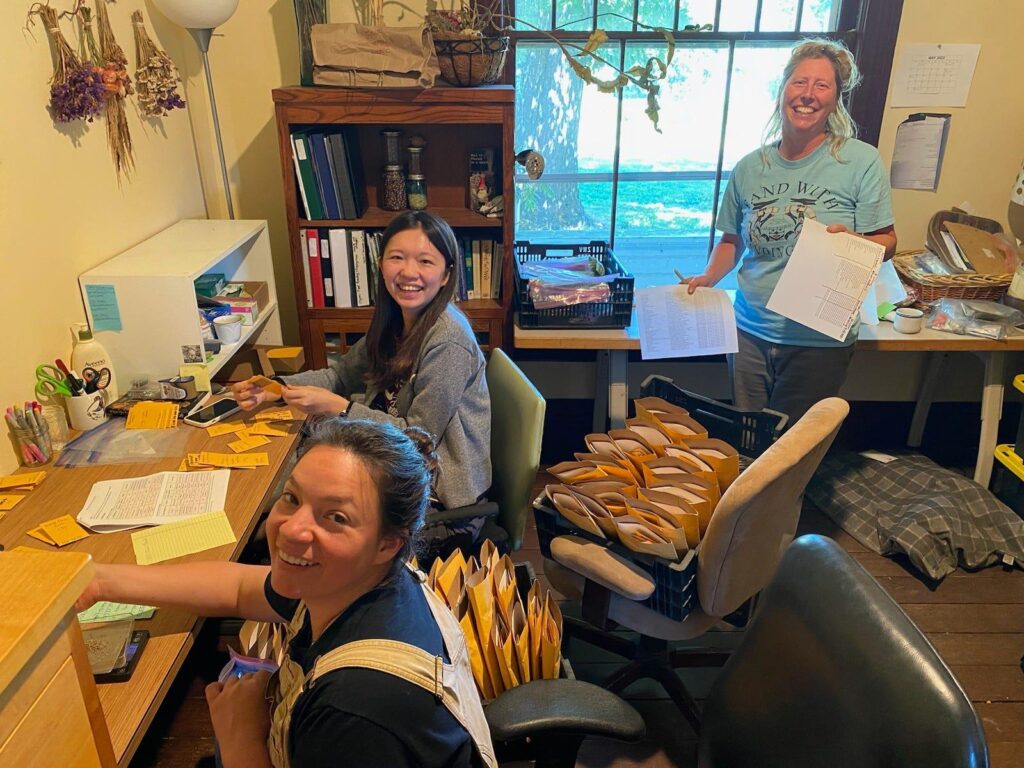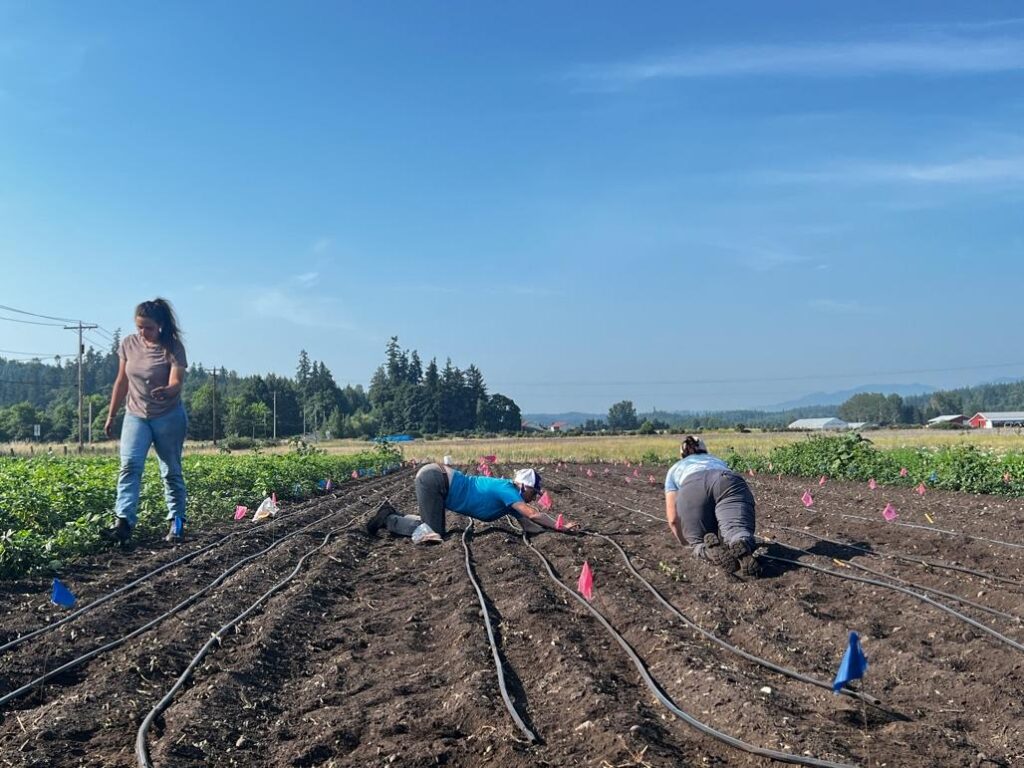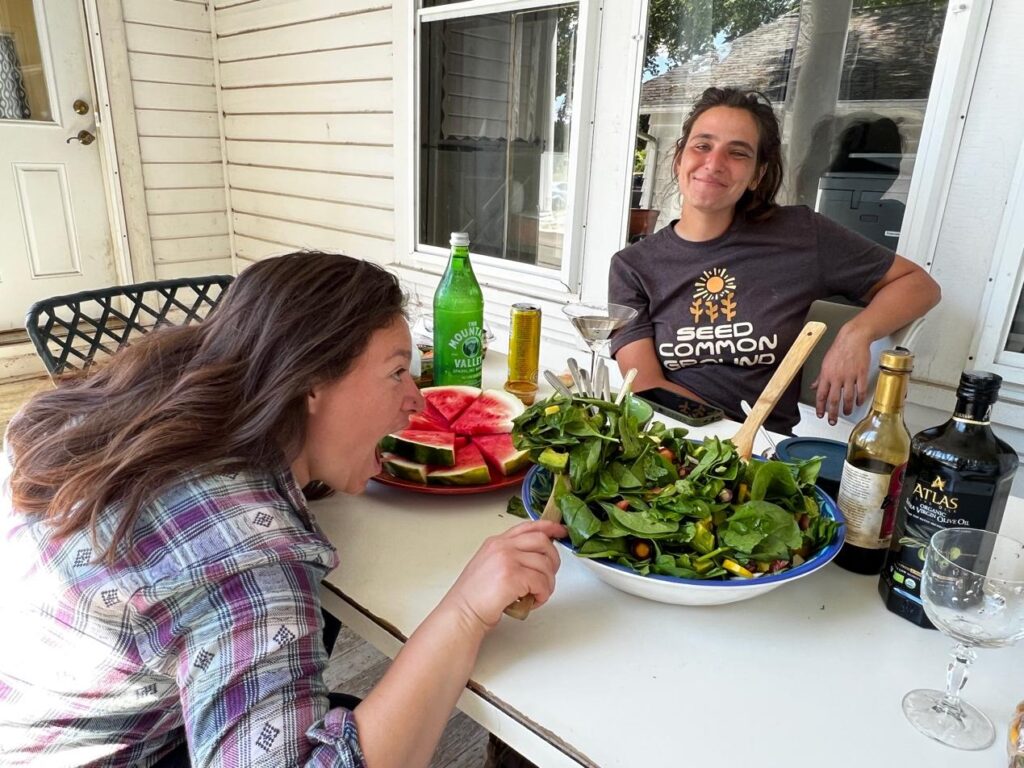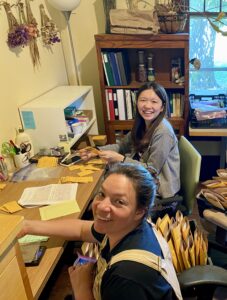
Organic Seed Alliance was lucky to host two wonderful young farmers as field interns on the research farm in Chimacum, Washington this summer. Yufen Chuang and Susana Cabrera-Mariz brought knowledge, experience, and enthusiasm to our field operations and we are so glad they came out to join us! Read below for their reflections on a summer working with seed.
OSA Summer of Fun by Susana Cabrera-Mariz
When I think about my summer internship at Organic Seed Alliance (OSA), what stands out isn’t what I learned about trialing varieties, breeding efforts, or farming techniques but how I was encouraged, taught, welcomed, and loved. I showed up at OSA’s Finnriver farm worse for wear with a tired soul, a sick heart, and a fatigued body. I had spent the last seven years as a farm apprentice, moving from community to community until I took a break from farming during COVID-19 to continue my studies. COVID-19 and Academia isolated me from the land, plants, and other beings. Like many, I was deeply lonely and yearning for connection.
What I found at OSA was a profound sense of connection and belonging. This belonging didn’t require me to abandon myself, history, or heritage but rather allowed me to show up as a soft, genuine, tender, and traumatized human. Likewise, I was greeted not by an organization but rather by the wonderfully imperfect and beautiful people, plants, and beings that make up Organic Seed Alliance. Among these charmingly flawed beings, I had the pleasure of hearing and speaking truth, breathing through vulnerability and discomfort, and honoring our collective trauma, all while growing out variety trials amongst kick-ass and highly skilled farmers, breeders, educators, and administrators. My summer at Organic Seed Alliance was filled with learning, growing, and remembering.
My journey alongside Organic Seed Alliance started six years ago when they gave scholarships to a group of Black, Indigenous, and People of color (through the Multinational Exchange for Sustainable Agriculture, Bay Area Farming Training Program) to attend the OSA Seed Conference. At this conference, I could conceptualize a community in which people like me were valued and belonged. The people I met and the stories I heard inspired me to start my seed journey.
Fast forward three years, through my work at Seed Savers Exchange in Decorah, IA, I participated in OSA’s Seed Production Course. At the end of the course, I sat down with OSA to discuss my next steps. Nervously, I blurted out what I desperately wanted but was afraid to acknowledge to anyone but myself. I wanted to do graduate research in participatory plant breeding. If I am being honest, I think I said I wanted to be the Latina version of Kristyn Leach. Without missing a beat, the group told me it was within the realm of possibility and immediately connected me with people to talk to. Their belief in my dream led me to pursue graduate school; I am now a semester away from finishing my graduate degree, which is focused on seeds and culture.
When I think about my summer, I remember the many ways in which this group of people have believed, supported, and cared for me over the years. I remember the laughs and stories shared over farm beds, the home-cooked meals and shared lunches, and the hardwon skill and knowledge shared amid trellising carrots and tomatoes. Most of all, I am in awe of everyone’s capacity to care, imperfectly show up, and learn alongside me while also being hot, sweaty, and covered in soil.
My PFP Experience with OSA, by Yufen Chuang
I’m Yufen Chuang from Taiwan, currently working as the Communications Officer for the Farmer Seed Network (FSN) in China. In July this year, I had the fortunate opportunity to participate in the US Professional Fellows Program (PFP) and found myself at the Organic Seed Alliance (OSA) in Washington State. OSA is dedicated to organic seed production and conservation. Through participatory research, hands-on education, policy advocacy, and network development, OSA actively promotes policies for the organic seed system. While the focus of my organization, the Farmer Seed Network, and OSA are slightly different, they share a common goal of protecting seed production and use and supporting farmers’ rights. We work to conserve seed and agricultural biodiversity by bringing together different stakeholders and creating networks or alliances.
Cara and Micaela gave me a great insight into OSA’s operations and organizational structure. OSA has staff not only in Washington State, but also in California and the Midwest, covering different regions of the United States. Despite its distributed workforce, OSA efficiently manages its operations online, a trend that has been accelerated by the COVID-19 pandemic. OSA’s weekly meetings facilitate communication and the sharing of knowledge between staff in different locations.
Within my organization, my primary responsibilities are communication and design. Cathleen, the Outreach Director, and Rebekah, the Information and events Coordinator, explained how OSA plans and implements its communication strategies, including newsletters tailored to different audiences and prominent annual reports. Staff in each region provide records of their respective projects or activities for content compilation and editing. OSA has established the Organic Seed Commons platform, which connects “seed people” from different regions and countries. It presents various topics, communities, courses, and activities in a comprehensive and systematic way. It is a highly confidential forum with a vibrant community that remains focused on its issues. Unexpectedly, I also discovered that some international partners I had previously worked with were part of this platform. Despite its small size, Seeds have the power to unite people from different regions, highlighting the importance of international and regional cooperation on seed-related issues.
I also had the opportunity to listen in on a discussion Cara was having with a grassroots organization called UJAMAA about setting up a seed hub. From this experience, I observed the importance the United States places on addressing BIPOC (Black, Indigenous, and People of Color) issues. Appropriate mechanisms and policies are in place for communities from diverse backgrounds and environments. Similarly, our work in China focuses on supporting smallholder and new farmers, enabling those at the forefront of agriculture to better access and protect their seed rights.
During my month-long visit, I really appreciated the time I spent with Kayla, Johanna and Susana on the farm. I participated in various activities including weeding, radish sowing, field management, spinach seed harvesting, seed packaging and distribution. This allowed me to experience the whole process of organic seed production and management. They are a passionate group of people dedicated to farming and breeding. As FSN staff are not directly involved in breeding, this was a fantastic and refreshing experience for me. I also participated in their seed packaging and distribution efforts, distributing 12 varieties of tomato seed to 60 different farms in different regions and climates for variety trials. Frequent manual weeding highlighted the challenges of organic farming.
I am immensely grateful to OSA for welcoming me and providing me with invaluable information and support. This is my first experience of living in an English-speaking country for more than a week, which initially caused some stress. I was worried about the language and cultural differences. However, as the differences became more apparent, so did the pleasant surprises. Before coming to the United States, I had a narrow view of American agriculture, thinking it was dominated by large-scale monoculture and that supermarkets controlled most of the food system. Fortunately, I found myself in the Pacific Northwest (PNW), an area with a beautiful and favorable geographical environment where organic farming thrives. At OSA and in the Port Townsend community, I could feel the deep love people have for the land. There is strong community support and involvement, not only from local government and universities, but also from supermarkets, restaurants, grocery stores and even hospitals with CSA. I really enjoyed this sense of community in Port Townsend.
With a group of like-minded individuals, they work together to advance organic agriculture and improve the quality of life through public education, policy advocacy and alliance building. Throughout this process, I have also witnessed how the United States drives a public issue. In addition to strong financial support, it provides opportunities for policy negotiation. Combined with OSA’s effective and comprehensive systematic planning, it all adds up to a powerful network that supports and empowers farmers in need. I consider myself fortunate and deeply grateful for the opportunity to come to a distant land, get closer to nature and understand organic.
We are all seed people.





